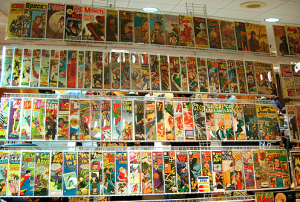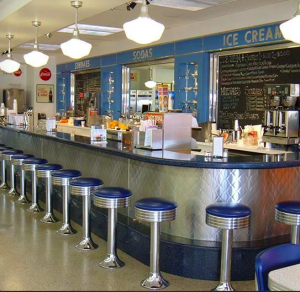I believe in ghosts, though not necessarily the kind that floats through the air. I believe in the ghosts that live in our minds: personal ghosts, historical ghosts, ghosts of all possible persuasions. I believe that every person’s life story contains within it a series of hauntings. Sometimes it can take years for us to realize how deeply we have been affected.
Here is one of my ghost stories.
My wife Alma and I have just settled into the train at Providence station; soon we’ll be setting off to visit our daughter in New York City. When the conductor arrives, Alma hands her our two folded tickets and then returns to checking email on her phone.
The conductor carefully, awkwardly separates the tickets while trying to scan their bar codes, and already I’m apologizing for not having first unfolded them for her. The conductor assures me it’s no problem, but I’m not quite convinced and regard her face for any barely concealed annoyance.
A few minutes later, finally underway, I half-worry that maybe we’re on the wrong train, not heading toward New York but instead barreling along in the opposite direction, to Boston, and that the conductor would have warned us about this, if only we’d properly unfolded our tickets for her. Should I say something? Of course not. We must be going the right way. Meanwhile, Alma continues checking her email.
At moments like this, I envy my wife’s ability not to worry. She will walk into a store expecting straightforward transactions, while I’m always looking to appease. When shopping, I don’t like calling attention to myself. It’s a low-level feeling of dread that I’ve become so used to that I barely notice it. Yet, nearly every day, it guides my actions.
All this, because of a stranger who has quietly haunted me for 60 years.
It began in the narrow space of a soda fountain shop, where on one side ranged a long lunch counter with its circular stools for customers.
On the other side stretched a wall filled with displays of magazines, newspapers, and comic books. I remember staring at all those comics. I was seven years old, and beside me stood my four-year-old brother, also entranced.
One comic book especially attracted my brother, and he held it tightly in his hands. We had no money, but our mother was buying yarn in the sewing shop next door. She had parked us here in front of the comic books, probably to give herself some peace.

“You wait here,” I told my brother. “I’ll get the money from Mom and be right back.” I should have known not to leave him alone.
I hurried to the sewing shop and wrangled from our mother the necessary dime, but when I turned to leave there stood my brother, comic book in hand. He had followed me, too young to understand you can’t leave a store without paying.
The soda fountain’s short order cook standing behind the counter watched us return, his broad face angry. He seemed huge, and I can still see his dark hair and thick arms, his white apron tight over a white t-shirt as he pointed a knife straight at us. To me, that knife looked as large as a machete.
He shouted, “Don’t you ever, ever do that again!”
Too furious to listen, our explanations and protests of innocence meant nothing to him. At least they didn’t until our mother finally arrived on the scene.
That short-order cook has likely long since passed away, but still, he lives in me. Although I almost never thought about him, he lurked within, hidden and yet able to spark my anxiety. Haunted without knowing that I was, perhaps my greatest secret source of disquiet wasn’t that I’d be falsely accused, but that my defense wouldn’t be heard or accepted, no matter what I said. When this feeling comes upon me, I might as well be lost in the recurring drama of a bad dream.
Sometimes I wonder if I have in turn haunted that short-order cook. Did the shock and fear on the face of a boy ever appear to him at odd moments? In later years did he feel regret for his behavior? Or maybe there had been a raft of shoplifting and he was on the alert, and the memory shaped him into a hero, because hadn’t he caught two budding thieves in the act and taught them a lesson?
And what of the others sitting at the lunch counter? Did that incident ever haunt them, did they question their silence at the cook’s fury, ever regret the missed opportunity to confront a bully who frightened two children?
These speculations are the stuff of fiction because I can’t know what went on in their minds, at that moment or after. I can only imagine.
Yet sometimes in our lives, we do encounter a person that we have haunted.
We perhaps too often emphasize how we are haunted, by people whose names we’ve never known, or by people whose names we’ve forgotten, or by people whose names we’ll never forget. But we are all accomplished at the haunting of others. Every living person doubles as a kind of ghost, and not just merely one ghost, but multiple ghosts, because we live, disembodied, in the minds and memories of those we live with, or have lived with, or those we have merely met. The richness of the material world too often dazzles and deceives us. We are far more than our physical borders. We park our presence in others.
Here is another of my ghost stories.
Two years ago, during my last semester teaching at the University of Illinois before retiring, I received an email from a former student I could just barely remember. Her name was vaguely familiar, and my only remembrance, more a feeling than a certainty, was that she had been a good student. I’ll call her here Dana. She was taking her two young daughters on a road trip during their spring break and would be in the Urbana-Champaign area for a day. Would it be possible to meet?
A week later we sat at a popular campus café, her two adolescent daughters politely incurious about their mother’s old professor. We went through some quick how-have-you-beens covering Dana’s past 25 years and mine. She had published a few essays during that time, she told me, but always wanted to write more. Then Dana took a manila folder from her large bag and opened it to reveal all the short stories she had written for my two classes, copies that included my hand-written comments.
“I have a couple questions,” she said, paging through a story. She stopped and pointed to one of my comments in the margins, and asked, “Could you explain what you meant by this?”
I was almost afraid to look. What had I possibly written that could have caused her to keep these stories all these years? As I began reading the comment by my 39-year-old self, strangely resurrected through my familiar awkward scribble, I remembered her writing, the incipient strength of it. Though a freshman at the time, she knew how to access the minds of her fictional characters’ interior lives. Their thoughts interested her as much as their actions, and that’s what I’d praised in my long-ago comment. She just needed to further explore this vast territory she had discovered.
Sitting there in the coffee shop, I told her this again.
“Did you mean it?” she asked.
Perhaps surprised by the surprise on my face, Dana explained that she’d taken a third creative writing class, with a colleague of mine who had discouraged her and caused her to doubt herself as a writer.
“I’ve always regretted not getting an MFA,” Dana said in a quiet voice that couldn’t quite disguise the emotion she held back.
Now I understood why we were meeting. For a quarter of a century, she had wondered who was right, had been haunted by the disparity between my praise and my former colleague’s discouragement. Whenever she sat down to write, two contradictory voices spoke to her. This meeting with one of her ghosts was an act of bravery on Dana’s part. She’d taken the risk of offering me an opportunity to break that tie within her and give her permission to proceed.
I should say that Dana now haunts me because, in that last semester of my teaching, I realized more than ever how easily a mentor could haunt a student. Our words matter more, perhaps, than we think, they sound louder and resonate more than we can imagine. How easy it is for our presence to haunt others and then to be haunted in turn by them. It’s almost second nature for our physical bodies to echo with ghosts of the past and present, ghosts vivid to us, or those we need to uncover.
I believe in ghosts. I believe that, in all their varied incarnations, they offer paths that might lead us to a deeper understanding of ourselves, if only we can learn how to better see them, if only we can better locate our own ghostly presences alive in others.
*
“I Believe in Ghosts” was first presented on the panel “Hauntings in Nonfiction,” on November 1 (the Day of the Dead!), at the 2018 NonfictioNow conference in Phoenix, Arizona. My fellow panelists—Kate McCahill, Michele Morano, Audrey Petty and Mimi Schwartz—shared with the audience their own personal landscape of ghosts. You can find a blog post from the journal, Assay, about the panel here.


